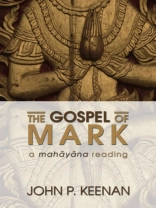John Keenan’s ‘The Gospel of Mark’ is a radically new reading of this most intriguing of the Synoptic gospels – a remarkable feat in the face of the explosion of Markan scholarship over the last twenty years. Keenan accomplishes this by approaching Mark as no other scholar has done: through the lens of Mahayana-Buddhist philosophy. This view stresses the emptying of all preconceived notions of how to begin reading as well as reclamation of such notions in terms of dependent co-arising and Jesus’ assault on the validity of conventional religiosity. ‘The Gospel of Mark’ displays an alternative hermeneutical procedure, one generated by the Mahayana understanding of the function of text and doctrine, and informed by Mahayana philosophy.
Part One of ‘The Gospel of Mark’ provides an overview of different interpretive techniques in Markan scholarship. It describes and argues for the validity of a Buddhist approach to this charter document of the Christian Gospel. Here the author demonstrates a profound grasp not only of scriptural scholarship but of Mahayana philosophy. Keenan discusses themes such as Mark’s elliptical style and the journeying that provides the impetus for the narrative, and explores them through the lens of emptiness and dependent co-arising which are the focal points of a Mahayana reading.
In Part Two Keenan gives the reader truly fresh insights into the paradoxical world of Mark’s Jesus. Through a Buddhist lens, the text offers startling and new perspectives on Jesus himself, the experience of the Kingdom, miracle stories and parables, the passion and death, the resurrection and return.
Sobre el autor
John P. Keenan is professor emeritus of religion at Middlebury College and a priest in the Episcopal Diocese of Vermont. His previous works include The Emptied Christ of Philippians: Mahāyāna Meditations; The Meaning of Christ: A Mahāyāna Theology; The Gospel of Mark: A Mahāyāna Reading; A Study of the Buddhabhūmyupadésa: The Doctrinal Development of the Notion of Wisdom in Yogācāra Thought; and Grounding Our Faith in a Pluralist World—With a Little Help from Nāgārjuna.







![Portada de Brian Schrag & Julisa Rowe: Community Arts for God's Purposes [Chinese] 貼近神心意的社群藝術 Portada de Brian Schrag & Julisa Rowe: Community Arts for God's Purposes [Chinese] 貼近神心意的社群藝術](https://static.worldofdigitals.com/thumb_webp/740/9781645083740.webp)




